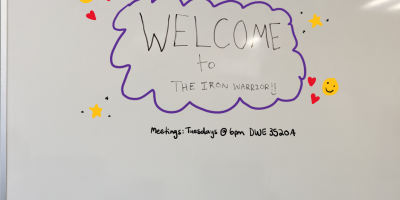Welcome to issue two of the Winter 2011 Iron Warrior. Again, we had an amazing production weekend and thank you to everyone who helped out. “Where is his face?!?!” and as always, caffeine, you have been a great help. I am very excited about the paper we have put together. This is most definitely an election issue of the paper, with profiles on EngSoc Executive candidates, WEEF Director candidates, FEDS Councillor candidates and Engineering Senator candidates. Please get informed and make an educated vote. Every vote matters.
This can be seen as a very overwhelming process. I mean, people are bombarded with information all of the time. I once heard a statistic stating that every day, we see roughly one thousand advertisements, whether online, as posters in the halls, or on giant billboard beside the highway. All this information can make it very easy to tune things out. But I think people are making it all too easy to tune things out these days. A perfect example is the current discussion regarding the use of the Engineering Society B mailing list. If you subscribe to this mailing list, at engsoc_b_general@googlegroups.com, which I believe everyone should do, you can expect roughly four e-mails each day. It is easy to simply archive them away in the deep recesses of your Gmail account, without as much as a glance at the content. Personally, at the very least, I read the subject heading of the e-mail before archiving to get a rough idea of the event or service being explained and whether or not it is relevant to me. Often times, people are missing a great deal of information that would in fact interest them. Resume critiques, TalEng, and WEEF proposals – these are just some of the hot topics gracing our inboxes lately.
Information overload is a big concern to student societies as well as larger organizations and governments. How do we get information out there to people who may be interested, when the people out there have auto-filters simply to cope with the vast amount of information they are exposed to? For a long time, posters and e-mails have been the main method of getting information out to the student body about things like FEDS and EngSoc. However, social networking through Facebook events and groups is an entirely new medium that works well for reaching the masses. The question now is, when will people start tuning out this form of information? For some of my friends, that has already started, with many event invitations going completely unnoticed.
What concerns me is the amount of important information that is being overlooked. How do we get the information we need in order to be informed citizens if we are not responding to the information we are receiving? At times is seems as though we live on campus in little bubbles. But it is important to stay up-to-date on community, regional, provincial, national and international issues. Being informed is easier now than it was at any other time in history. I make it a part of my daily routine by visiting my favourite news websites each morning while I eat breakfast. For suggestions on several good new sources, please take a look at Alex Hogeveen Rutter’s article on page 17. Whether it is UW’s Daily Bulletin (http://bulletin.uwaterloo.ca/) or Reuters Canada (http://ca.reuters.com/), all levels of information are valid.
When looking at politics specifically, apathy is a big concern for all levels of government. In many cases, voter turnout is absolutely abysmal. There are countries all over the world seeking democracy, and here we are, with the option to vote, and yet we choose not to. In Australia, citizens are actually fined should they neglect their democratic duties. Overall, this seems like a good idea. It certainly brings out more people to the polling stations. However, the argument could be made that there are now just more people blindly casting ballots. I like to think that the majority of the time, Australians are educated voters, voting responsibly. For more on political apathy, please take a look at Spencer McEwan’s article on page 19.
Municipal politicians have increasingly been reaching out to students. Jeff Henry, a Waterloo Engineering Alumnus and Waterloo City Councillor, came to give a talk last week. He discussed how he got into politics, which all began when he was a student here. We were also able to discuss issues surrounding the proposed changes to rental housing in Waterloo, a hot topic among students. For more information on Jeff Henry and the rental housing changes, see pages 3 and 5, respectively.
Right now with all of the elections happening on campus, and while trying to stay up-to-date on the affairs of the world, it is crucial that you take the time to become informed. We are all busy; life is a constant juggling act between the things you have to do and trying to fit in fun wherever possible. But voting is a responsibility – a priority to be taken seriously. Right now, our campus has its very own Rhino Party – a party urging voters to toss away their vote in political protest against FEDS, whose ultimate goal is to disband FEDS altogether. This issue of The Iron Warrior discusses the UW Rhino Party pros and cons at length in the Point Counter Point on page 18.
From now on, I implore you to know what is going on around you. Simply saying that you don’t know what a group does for the student population at large is no excuse. Because they do a great deal! And just because you may be uninformed, it doesn’t discount their importance. Time and time again I have heard shocking untruths about WEEF or FEDS or EngSoc from individuals who haven’t bothered to find the correct information. An informed opinion is an opinion worth listening to! The right information is out there; seek the good stuff and keep on tuning out the rest. Just getting that minimal understanding is a big step forward. There are people to talk to in person. Ask questions, from your classmates or from someone holding an elected position. We are here for you and to help inform you.
And just a quick comment to all of the candidates in the student society elections: thank you for putting yourselves out there to make these elections possible. It is because there are multiple candidates for positions like Engineering Society President that people will be able to get involved in the decision making process. It is through this process that issues can be debates and apathy can be edged away, bit by bit. Campaigning can be draining and I wish you all the best, looking forward to reading each of your platforms to see your ideas and where EngSoc is headed next. Good luck everyone.




Leave a Reply